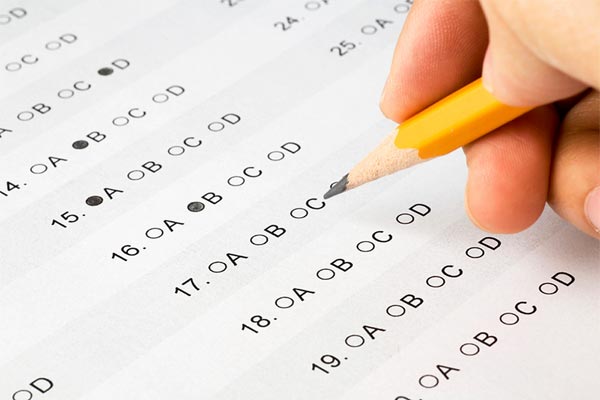The Testing Effect by Mikayla Geiger

Imagine it is the night before an exam and you forgot to study. What do you do? Maybe you decide to try to skim through the book or your notes and pick out the things that look important. Or maybe you read the material over and over and over again in hopes that you remember it. After spending all night studying, you show up to take the test unprepared and not very confident in your abilities. Well fortunately for you there is another very effective way to study. Taking a test is the best way for students to retain information and use their study time efficiently.
Taking a test helps memory because it causes the brain to initiate retrieval. According to cognitive psychology professor Nate Kornell, et al., retrieval takes place in two stages. Stage 1 begins when a cue is heard and as soon as the answer is remembered stage 2 retrieval takes place. Kornell, et al. studied a group of people to find if retrieval had to be successful in order to be effective. He gave two groups cue words and target words to study. One group was then given the cue word and asked to write down the target word from memory. The other group was given both the cue word and target word and asked to write down the target word. When the two groups were later tested on the words, there was no difference found in memory. (Kornell, et al.) These results show that it does not matter whether retrieval takes place from an outside source or from within the brain, it still enhances memory. Practically, students don’t necessarily have to remember the correct answer as long as they are able to retrieve it from some outside source. If a student is asked a question, they may be unable to retrieve the correct answer but if someone immediately tells them the answer retrieval will still take place.
Retrieval is not the only way that taking a test can help students. In a study done by psychological and brain sciences professor, Mark McDaniel, et al., three groups were given a packet of information to read and came back two days later to study. The first group was the TTT group who took three consecutive tests. The second group, the SSS group, studied in three consecutive sessions. And lastly was the TST group who took a test, then studied, and took another test. In this test none of the groups were given any feedback. Five days later the groups were tested on the information and TTT scored the highest overall, followed by the TST and SSS group. (McDaniel, et al.) This confirmed that the testing method does help students to retain information better than simply studying over and over again.
The study was then repeated, only this time each group was given feedback. The SSS group was given a study guide and both of the testing groups were told whether their answers were right or wrong, but the TST group was only told the correct answer after the final test. This time the TST group scored the highest followed by the TTT and SSS groups. (McDaniel, et al.) As the first study showed, testing is definitely a better option than just studying, but it is even more effective when feedback is given. Students get a chance to see what they have done wrong and what needs to be improved on. They can then spend more time studying the information that they do not know, rather than wasting time studying what they already know.
A common thought on testing is that multiple choice quizzes are easier because students are given the answer, they just have to be able to recognize it. Fill-in-the-blank on the other hand may be harder for students, but it could also be thought to help students retain the information better. A professor of psychological and brain sciences, Kathleen McDermott, et al., studied science classes over the course of three semesters and then repeated on a high school history class to confirm results. Some students engaged in normal study techniques while others were given review quizzes. Students in the quiz groups were split further into two groups as some were given multiple choice and others were given fill-in-the blank quizzes. The students were given a unit exam on the information and later a final exam and their test scores were compared. As the other tests have shown, students who took the quizzes definitely scored higher than students who just studied. The results varied from test to test, but overall the results of the students who were given either a multiple choice or fill-in-the blank quiz were close. The researchers concluded that there was not a significant difference between the two formats. (McDermott, et al.)
In the same study by Kathleen McDermott, et al., it was also studied whether the questions needed to have the same format or wording on the review quiz as they appear on the unit and final exam. What they found is that it did not matter if the questions were the same on the unit and final exams, the review quizzes still helped the students score higher. (McDermott, et al.) This confirms that testing truly helps students retain information, not just memorize questions and the correct answers. Quizzes initiate retrieval, which in turn helps students to remember the information later and be able to apply it to other questions.
Review quizzes definitely help students to remember information, but some have wondered whether the quizzes must be taken at a specific time after learning the information. Cognitive Psychologist Yana Weinstein, et al., studied this by separating groups into two sections. One group was given a packet of information to read and asked one question immediately following each of the ten sections. The other group was asked the same ten questions but only after reading the whole packet. Initially, the group that was asked the questions intermittently throughout the reading remembered better, but when they were tested a week later, the scores were almost equal. (Weinstein, et al.) It is interesting to note that in the study by McDaniels, et al., the groups came back two days later to study and take the review quizzes and the testing was still more effective than studying. It seems that there is not a specific time frame in which the quizzes must be taken in order for them to be effective. Students can take tests immediately following the information they have read, or take them when the time comes to review for an exam.
You can implement many different testing techniques into your studying time. One way that you can study for weeks before the exam is by using the review questions at the end of the chapters. Often people may just skip over these, but they are actually very valuable to learning information. In addition, many teachers may make students take pop quizzes or review quizzes throughout the semester. Instead of looking at these as just another pointless assignment, try to learn from them and find how you can do better in the future. Even if you do not pass, you may be able to use them to help you to study in the future.
Those are both very helpful ways for you to study throughout the course, so that you are not cramming the night before. But it is always helpful to study the day before the exam. When the time comes you can take all of your notes, especially focusing on information you have struggled on in the past, and use it to quiz yourself. There are many different ways to do this. You can make a study guide and have someone else use it to ask you questions. Another option is to make notecards that you can use to quiz yourself. There are even websites, such as Quizlet.com, that allow you to make online flashcards and then turn them into quizzes. Either way, taking a few quizzes on the information the day before the exam will not only refresh your memory, but make it clear what you need to spend more time studying. Then you can take some time to focus your studies on those topics and get a good night’s sleep before the exam.
Next time you find yourself in a state of panic before an exam, take a deep breath and remind yourself that there is a better way to study. Gather all of the information you have, and create a test for yourself. Taking the test will help you make the most efficient use of your study time. Not only will you be able to retain the information better, you will also know what information you need to spend more time studying before the exam. After that, the only thing left to do is confidently walk into the exam and ace it.
Works Cited
Kornell, Nate et al. “Retrieval Attempts Enhance Learning, but Retrieval Success (versus Failure) Does Not Matter.” Journal of Experimental Psychology: Learning, Memory, and Cognition, vol. 41, no. 1, Jan. 2015, pp. 283–294. PsycARTICLES, doi:10.1037/a0037850. Accessed 17 October 2016.
Mcdaniel, Mark A. et al. “When Does the Test-Study-Test Sequence Optimize Learning and Retention?” Journal of Experimental Psychology: Applied, vol. 21, no. 4, Dec. 2015, pp. 370–382. PsycARTICLES, doi:10.1037/xap0000063. Accessed 17 October 2016.
Mcdermott, Kathleen B. et al. “Both Multiple-Choice and Short-Answer Quizzes Enhance Later Exam Performance in Middle and High School Classes.” Journal of Experimental Psychology: Applied, vol. 20, no. 1, Mar. 2014, pp. 3–21. PsycARTICLES, doi:10.1037/xap0000004. Accessed 17 October 2016.
“Quizlet.” Quizlet, https://quizlet.com/. Accessed 17 October 2016.
Weinstein, Yana et al. “On the Placement of Practice Questions during Study.” Journal of Experimental Psychology: Applied, vol. 22, no. 1, Mar. 2016, pp. 72–84. PsycARTICLES, doi:10.1037/xap0000071. Accessed 17 October 2016.

